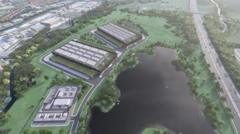Is the Government Ready to Tackle a Legal Challenge on Data Centres?

Campaigners are challenging the UK government's approval of a significant data centre project in Buckinghamshire, citing concerns about environmental impacts and local energy supplies. They argue that the decision undermines local planning objections and could lead to increased energy costs for residents and businesses.
Last updated: 23 October 2023 (BST)
Understanding the Controversy Surrounding the Data Centre
The proposed data centre at the Woodlands Park landfill site in Iver has sparked considerable debate and legal action. Initially rejected by Buckinghamshire Council, the project was later approved by the government, leading to concerns from local campaign groups about its potential environmental consequences and strain on local resources. This article delves into the specifics of the situation, exploring the implications of the government’s decision, the arguments from campaigners, and the broader context of data centre development in the UK.
Key Takeaways
- The Buckinghamshire Council initially rejected the data centre plans due to environmental concerns.
- The government overturned the decision, granting planning permission despite local objections.
- Campaigners argue that the centre could negatively affect energy supply and prices in the area.
- Environmental impact assessments are being called for by campaign groups.
- The UK currently hosts approximately 477 data centres, with numbers projected to rise significantly.
The Approval Process and Legal Actions
In June 2024, Buckinghamshire Council denied planning permission for the data centre, primarily due to its potential harm to the green belt environment. The council's decision reflected a growing concern about the sustainability of data centre expansions in ecologically sensitive areas. However, in a surprising turn, the government intervened following an appeal from the developer, Greystoke, and approved the project.
The legal action taken by the not-for-profit organisation Foxglove and the charity Global Action Plan is a direct response to this approval. They have invoked Section 288 of the Town and Country Planning Act 1990, which allows individuals or groups to challenge planning decisions in court. Their appeal highlights the lack of a comprehensive environmental impact assessment (EIA), a critical tool designed to evaluate the potential effects of a project on the surrounding environment.
Environmental Concerns and Community Impact
Rosa Curling, co-executive director of Foxglove, emphasised the potential consequences for local residents and businesses. Her comments reflect worries that the data centre, dubbed the West London Technology Park, will exacerbate existing energy supply challenges. Curling stated, "Local people and businesses in Buckinghamshire will soon be competing with a power guzzling-behemoth to keep the lights on, which as we've seen in the states, usually means sky-high prices."
Oliver Hayes, head of campaigns at Global Action Plan, echoed these concerns, pointing out that the government's insufficient scrutiny of the application could have serious repercussions for the local community. The potential rise in energy prices and the strain on local infrastructure are critical issues raised by both campaign groups.
The Broader Context: Data Centres in the UK
The UK is home to a rapidly growing number of data centres, with estimates suggesting there are around 477 facilities currently operational. These data centres serve as essential hubs for digital services, including streaming, online banking, and cloud computing. As demand for digital resources continues to rise, so does the necessity for more data centres. Projections indicate that the number of facilities is expected to increase by nearly 20% in the coming years.
The government's rationale for approving the Iver data centre hinges on the need for increased data capacity to support a digitally-driven economy. However, this comes at a time when the environmental implications of such developments are under intense scrutiny. Critics argue that the rapid expansion of data centres without adequate consideration for their environmental impact could lead to long-term challenges for climate change and local ecosystems.
Government's Position on Data Centre Development
Housing Minister Matthew Pennycook, who represented the government in this decision, acknowledged the potential landscape effects of the data centre but maintained that these concerns were outweighed by the national need for data facilities. The government has already granted planning permission for additional data centres in nearby areas, signalling a commitment to expanding this sector despite local pushback.
Greystoke, the developer behind the Iver project, has defended the plans, asserting that the data centre will incorporate environmentally beneficial features. A spokesperson indicated that the design includes sustainable building standards, as well as solar panels and heat pumps intended to mitigate the facility's environmental footprint.
Potential Economic Implications
The economic implications of the data centre's approval extend beyond immediate energy supply concerns. The project is expected to create jobs and stimulate local investment; however, these benefits must be balanced against the potential for increased energy costs for residents and businesses. As energy demands rise with the operation of the data centre, local consumers may face higher bills, leading to broader economic challenges in the community.
What Happens Next?
As legal proceedings unfold regarding the planning appeal, the outcome remains uncertain. The campaign groups' challenge will inevitably lead to greater scrutiny of the government's decision-making process. If the courts rule in favour of the campaigners, it could set a precedent for how similar projects are assessed in the future, potentially requiring more rigorous environmental evaluations for data centres.
On the other hand, should the government’s decision be upheld, it may encourage further development of data centres across the UK, even in sensitive areas. This scenario raises questions about the balance between economic growth and environmental preservation, a topic that is likely to remain at the forefront of public discourse.
Conclusion: A Balancing Act for the Future
The controversy surrounding the Woodlands Park data centre exemplifies the challenges of balancing technological advancement with environmental stewardship. As the demand for digital infrastructure grows, so too does the need for careful consideration of the impacts these developments have on local communities and ecosystems. The ongoing legal challenge will play a crucial role in determining how the UK navigates this complex landscape.
With the stakes high for local residents and the environment, how can the government ensure that future developments meet both economic needs and ecological standards? The resolution of this case could provide valuable insights into the path forward for data centre development in the UK. #DataCentreDebate #EnvironmentalImpact #BuckinghamshireChallenges
FAQs
What is the Woodlands Park data centre project?
The Woodlands Park data centre project is a proposed facility in Iver, Buckinghamshire, which aims to provide digital infrastructure but faces opposition due to environmental concerns.
Why did Buckinghamshire Council initially reject the plans?
The council rejected the plans due to fears that the data centre would harm the green belt environment and strain local energy supplies.
What legal action has been taken against the government's decision?
Campaign groups Foxglove and Global Action Plan have filed a planning appeal under Section 288 of the Town and Country Planning Act 1990, arguing that the environmental impact was not properly assessed.
How many data centres are currently in the UK?
There are approximately 477 data centres in the UK, with expectations for this number to grow by nearly 20% in the coming years.
What are the potential economic impacts of the data centre?
While the data centre could create jobs and stimulate local investment, it may also lead to increased energy prices for local residents and businesses.
Published: 2025-08-21 12:00:45 | Category: sport



